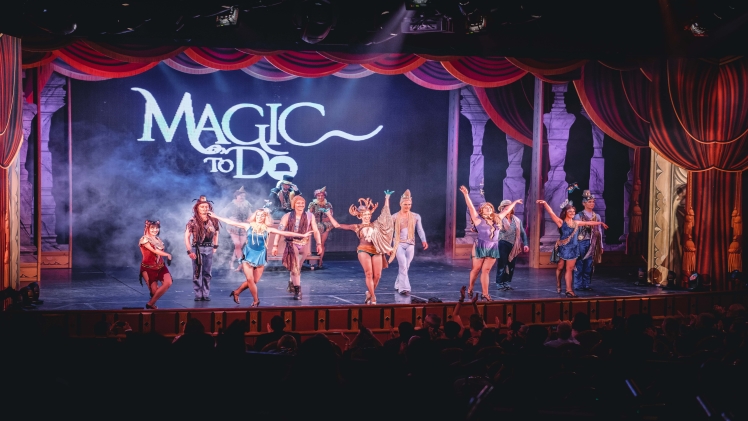Introduction:
Entertainment, as a vast and ever-evolving landscape, serves as a mirror reflecting the pulse of society. From timeless classics to cutting-edge innovations, the world of entertainment encompasses a rich tapestry of experiences that captivate, inspire, and connect people across cultures and generations. This article explores the multifaceted dimensions of entertainment, examining key trends, technological advancements, and the enduring impact of creative expression.
Historically, entertainment has taken various forms, including live performances, storytelling, and visual arts. The performing arts, such as theater, dance, and music, have been foundational to human expression, fostering communal experiences that transcend time and space.
Emergence of Mass Media:
The advent of mass media, including radio, television, and cinema, brought entertainment to a broader audience. These mediums allowed stories and performances to be shared on a global scale, shaping cultural narratives and influencing societal perspectives.
The digital revolution, marked by the rise of the internet, transformed the entertainment landscape. Online platforms became hubs for content creation, distribution, and consumption. Streaming services, social media, and user-generated content ushered in a new era of accessibility and interactivity.
Streaming platforms have revolutionized how audiences access and enjoy content. Services like Netflix, Hulu, and Disney+ offer a vast array of movies, TV shows, and documentaries, providing viewers with on-demand entertainment tailored to their preferences.
User-Generated Content:
The democratization of content creation through platforms like YouTube, TikTok, and Instagram has empowered individuals to become creators. User-generated content spans a spectrum of genres, from educational videos and vlogs to comedic sketches and music performances, reshaping the traditional producer-consumer dynamic.
In recent years, there has been a growing emphasis on diversity and inclusion within the entertainment industry. Calls for authentic representation and the amplification of underrepresented voices have led to a shift in storytelling, resulting in more inclusive narratives across film, television, and other mediums.
Advancements in technology have given rise to interactive entertainment experiences. Video games, augmented reality (AR), and virtual reality (VR) offer audiences immersive and participatory forms of entertainment, blurring the lines between fiction and reality.
Transmedia Storytelling:
Transmedia storytelling involves the expansion of narratives across multiple platforms and mediums. Franchises like Marvel and Star Wars have successfully utilized transmedia storytelling to engage audiences through films, TV series, comics, and interactive experiences, creating interconnected universes.
Virtual and augmented reality technologies have opened up new possibilities for entertainment. VR allows users to step into virtual worlds, offering immersive gaming experiences and interactive storytelling. AR enhances the real world by overlaying digital information, creating innovative marketing campaigns and interactive applications.
AI is playing a significant role in entertainment, from content recommendations on streaming platforms to the creation of music and visual arts. AI algorithms analyze user preferences to curate personalized content, while AI-generated art challenges traditional notions of creativity.
Blockchain Technology:
Blockchain technology is disrupting traditional models of content distribution and ownership. Through blockchain, artists and creators can receive direct compensation for their work, and digital assets, such as non-fungible tokens (NFTs), are transforming the way digital art and collectibles are bought and sold.
Live streaming has become a dominant trend, with platforms like Twitch and YouTube Live connecting content creators directly with their audiences. Live streaming spans gaming, music performances, educational content, and even everyday activities, fostering real-time engagement and community-building.
Podcasting has emerged as a popular form of on-the-go entertainment and information. The ease of production and accessibility of podcasts on various platforms have allowed individuals to share stories, discuss niche topics, and engage listeners on a global scale.
Short-Form Content:
The popularity of short-form content on platforms like TikTok and Instagram reflects changing consumption habits. Bite-sized videos, often ranging from a few seconds to a few minutes, cater to audiences seeking quick, engaging, and shareable entertainment experiences.
Entertainment has long served as a vehicle for social commentary, addressing relevant issues and shaping public discourse. Through film, television, music, and literature, creators have the power to influence societal attitudes, challenge norms, and advocate for change.
Fandom and Community:
The rise of fandom culture has given birth to passionate communities built around shared interests. Fandoms connect individuals globally, fostering a sense of belonging and collective enthusiasm. Social media platforms provide spaces for fans to interact, share fan art, and participate in discussions.
Mental Health and Well-Being:
Entertainment can have a profound impact on mental health and well-being. Engaging with uplifting and relatable content can provide escapism and comfort. Conversations surrounding mental health in entertainment, such as in film and television, contribute to reducing stigma and increasing awareness.
The digital age has brought challenges related to piracy and copyright infringement. The ease of unauthorized distribution poses threats to creators and the industry as a whole. Efforts to combat piracy involve legal measures, technological solutions, and education on the importance of supporting creators.
Representation and Diversity:
While strides have been made, the entertainment industry still grapples with issues of representation and diversity. Calls for more inclusive casting, authentic storytelling, and equitable opportunities for underrepresented groups continue to drive conversations and initiatives for change.
The rapid dissemination of information online has led to challenges related to misinformation and accountability. Content creators and platforms are increasingly under scrutiny for the spread of false information, requiring measures to ensure accuracy, transparency, and responsible content creation.
The ongoing integration of virtual and augmented reality is poised to revolutionize live events. Virtual concerts, immersive theater experiences, and interactive exhibits are just a glimpse into the potential of virtual events, offering audiences new ways to engage with entertainment.
Sustainability in Entertainment Production:
Sustainability is becoming a focal point in the entertainment industry, with efforts to reduce environmental impact in production processes. From eco-friendly film sets to green energy initiatives in events, the industry is recognizing the importance of responsible practices for a sustainable future.
Continued Convergence of Mediums:
The convergence of various mediums, including film, television, gaming, and interactive experiences, will continue to redefine entertainment. Collaborations across industries and the blending of storytelling techniques will create novel and innovative forms of content.
Conclusion:
Entertainment, as a dynamic force, remains at the forefront of cultural expression, societal reflection, and technological innovation. From traditional storytelling around a campfire to immersive virtual reality experiences, the evolution of entertainment has mirrored the evolution of human expression and connectivity.





